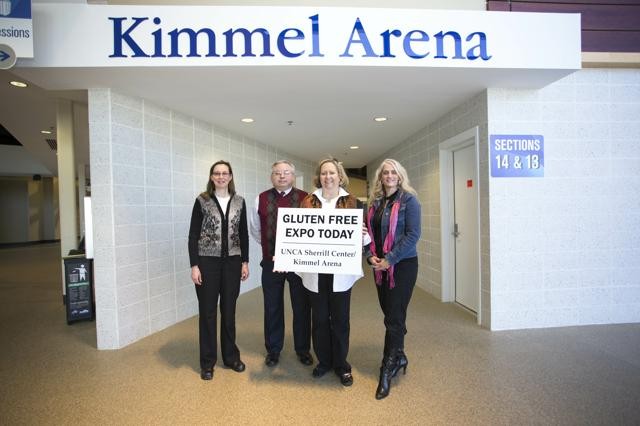This Saturday, UNC Asheville’s Sherrill Center will be transformed into a state-of-the-art gluten-free education center with 55 vendors offering tastings, cooking demos and the latest information. Organizers hope the Gluten-Free Expo will help dispel some of the popular myths surrounding why people choose the diet.
The media’s portrayal of gluten-free as just another fad diet has proliferated misinformation, says Ingles Dietitian Leah McGrath. “I’ve worked with people suffering from celiac disease for eight to 10 years now,” McGrath says. “They suffered a long time before being diagnosed.”
Sheila Horine, branch manager of the Gluten Intolerance Group of Asheville, finds the persistence of this uninformed attitude disheartening.
“For people with celiac disease, the gluten-free diet is their medicine,” Horine explains. “Celiac disease means the body is not absorbing the nutrition it needs.”
All of Horine’s children (three daughters) were diagnosed with celiac disease a decade ago. “There’s a lot of outdated information on the Internet,” Horine says. “At the expo we work with the latest actual scientific information out there.”
Posana Café Executive Chef Peter Pollay, who is also president of Asheville Independent Restaurants, says that when his wife, Martha, was diagnosed with celiac disease seven years ago, it was his first knowledge of the disease. Now Pollay’s restaurant is the only 100-percent gluten-free restaurant in Asheville.
“For the first three years we were open, we didn’t mention it,” Pollay says. “People eating at the restaurant didn’t even notice.”
Although Pollay says he has observed more people choosing to eat gluten-free, those with celiac disease have zero tolerance.
Horine says cross-contamination can result from a minuscule amount of gluten. “Last summer, the Food and Drug Administration defined gluten-free products; they need to contain less than 20 parts per million,” Horine says. “That’s less than a crumb.”
Pollay knows that restaurants try hard to offer gluten-free options, but gluten can hide in many places. “If you deep-fry a breaded onion ring in oil, the oil is contaminated,” Pollay says. “It can be spread with tongs, hands, bowls.”
Ingles Markets will sponsor the expo, along with the Hendersonville Celiac Support Group, but all proceeds will go toward the nonprofit Gluten Intolerance Group of Asheville.
McGrath, who assists with vendors and logistics, says this year’s layout will reflect a day in a gluten-free life. Attendees will be guided through displays of breakfast foods, snacks and lunch items, rounding it out with dinner entrees. There will even be gluten-free beer and cider, and sweet treats like Jelly Belly candies and gluten-free cookies.
Speakers include Rachel Begun, a nutrition expert, consultant and blogger, who will talk at 10:15 a.m. on “Preventing Cross Contact: The Next Frontier in the GF Community.” Beth Hillson, president of the American Celiac Disease Alliance and cookbook author, will speak at 11:45 a.m. on “How to Make Over Your Favorite Recipes to Gluten-Free.” A panel discussion follows at 1 p.m.
Horine offers a bit of advice before people start on a gluten-free diet: get tested for gluten intolerance first. “The test doesn’t work unless you are eating gluten,” Horine says.
Gluten-Free Expo, 10 a.m.-2 p.m. March 29, UNCA’s Sherrill Center/Kimmel Arena, 227 Campus Drive.
Entry fee: $5 for ages 12 and older ($20 maximum per family)
Details: ashevillegig.org, ingles-markets.com/dietitian/leah/asheville-gluten-free-expo




Wish I could attend.
No matter I’ve not been tested. The pain stopped within 24 hours of going gluten free. I’m gluten sensitive and see no reason to go back to feeling that bad just for a test to confirm what I already know.
Gluten free helped one set of pains. Another set of pains cured by going dairy free. Nothing is easy–or simple.
What i’d like to know is if this can be brought on by extreme life stress.
I am fully convinced the manifestation of Celiac Disease or Gluten Intoletance can be brought on by extreme or prolonged stress. I went through a period of extreme prolonged stress and after a period of almost a year I was surprised agnoaes with Celiac Disease. I was told by the gastroenterologist that stress can trigger the autoimmune response for the disease to become active. The enzymes found in the gut play such an important role in our mental and emotional wellbeing and when things get out of balance
or unduly stressed, then the body reacts.
Over the years the stressful events have lessened but the determinal effects precipitated by the stress have caused havoc in my body and the Celiac Disease while under control is still present.
present.